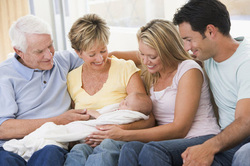
 Here is an article to share with friends and family with advice for how the can best help and avoid burdening the new mom and dad in first few weeks of baby's life. This should also give you a good idea of what you can expect or hope for from others. If making plans and having visitors is too stressful or exhausting at this stage, politely explain and see if you can find the best way to fulfill their desire to help you and your need for help of any kind. While they might want to spend time with parents and baby together, maybe a friend coming over and watching baby while you take a shower or bringing dinner for you to eat alone or with the preparer could be the most comfortable and the best use of time and energy during those early weeks. Don't be afraid to ask for help and tell people how they can be most helpful.
0 Comments
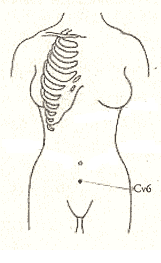 If your baby is delivered by c-section, you will receive instructions from your a care provider about how to care for the incision site, appropriate physical activity, and what to expect from your body. After initial recovery, you can also employ holistic methods to better how you feel and aid the healing process. These practices include scar tissue massage, acupressure, and ingestion of healing promoting nutrients & minerals and the whole foods in which they can be found. This aricle is a great introduction to these methods. Read more about these techniques here and don't forget to discuss with your practitioner at an appointment or by phone to make sure they are safe for you. 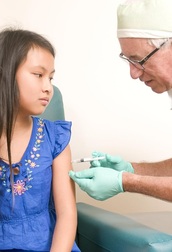 The decision of when, how, and why to vaccinate (or not vaccinate) your young child is a hot topic spanning personal health, public health, spirituality, freedom, environment, and parenting forums nationwide. How can one sort through the loaded arguments, personal anecdotes, reasonable assumptions, hypotheses, and scientific research to come to an fully informed decision that is yours and yours alone? One resource to start you off is an interview with Midwife and MD Aviva Romm. She discusses the many options and challenges facing families making these tough decisions in this recorded webinar. Her approach to medicine is holistic and natural and she also has the research and clinical knowledge to balance the potential pros and cons of the both sides. Best of all she truly approaches the topic from a unbiased, nonjudgmental perspective, presenting any and all relevant evidence. More information can be found in her book, Vaccinations: A Thoughtful Parent's Guide. Topics include: - Reasons people choose to not vaccinate or vaccinate their kids - Benefits and side effects of vaccination - How spacing vaccinations alters and fails to alter the potential side effects - The most important vaccinations for children in the US - Which vaccinations might be needed for international travel - How to minimize reactions to vaccinations - Natural methods of supporting the immune system  New research is showing that pregnancy-influenced mood disorders are not limited to the immediate postpartum period. Symptoms can occur early in pregnancy, immediately following birth, or start any time leading up to the child's first birthday. Prenatal and postpartum depression and psychosis are real conditions often brought upon by the extreme fluctuation of hormones during pregnancy and following birth. Affliction is not representative of weakness, disability, or lack of love for one's child, but a functioning endocrine system that is in recovery mode. If you or a mother you know are experiencing overwhelming emotions, thoughts, or visions; physical and/or or emotional exhaustion; worry or anxiety; or difficulty bonding with your baby or accepting your pregnancy, reach out to a trusted loved one, healthcare provider or doula for support. Doulas aren't just here for labor but the prenatal and postpartum period too. PPD affects as many as one in five women. Reach out and let your loved ones help on the road to recovery and a healthier, happier motherhood. NYT Article on Postpartum/Prenatal Depression, Anxiety, and Psychosis 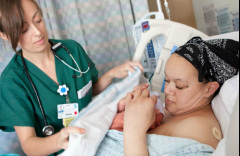 It's the possibility that most hope they don't have to face, but you never know if you and your baby might need an emergency or planned c-section. If it does come to that, you can still prepare for the best c-section experience you can have. Things to consider: - Requesting skin to skin on your chest - Request your partner or an accompanying family member or friend do skin to skin if you cannot - Request to stay with your child while being stitched and moved to recovery - Request sutures instead of staples, mothers with sutures are less likely to have complications and more likely to be satisfied with the stitches and scar appearance (Ob Gyn News) - If you are morbidly obese, discuss a vertical incision instead of the typical transverse (Ob Gyn News) - If a c-section is planned and there are no complications, see if you doctor can accommodate you waiting for you to go into labor instead of scheduling a date 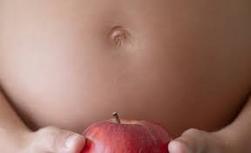 Aviva Romm, family health practioner, herbalist, midwife, and MD, discusses the risks associated with gestation diabetes in this article. She discusses the need for pregnant mothers and practitoners to asses the mother's risk at developing GD and their nutrition and diet. But she posits that universal glucose testing may not be the best solution. The best take away here though is this... "One thing that I know for sure is that you can’t be forced to have GDM testing, and nobody should bully or “guilt” you into it. Autonomy is one of the foundational principles of modern medicine – patients, including pregnant women, have the right to choose what is best for them. Bullying does happen to pregnant women too often in prenatal encounters. It is unacceptable. We all have the right to stop and consider tests and procedures on an individual basis; medicine would be a much better profession if more doctors did so! 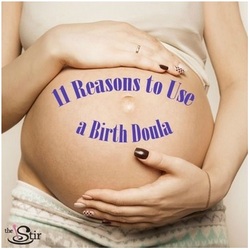 Do I Need a Doula? 11 Good Reasons to Use One From Cafemom's The Stir with journal and statistical references!  While it's only been a year since I officially started this work, I absolutely love it and know I have found my calling. I wouldn't be here celebrating doula month without the incredible mothers and partners I have been able to work with so far. Thank you all! Happy doula month to you and all the other inspiring doulas and mother caregivers I have the pleasure of knowing. 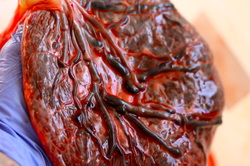 The placenta- this incredible organ that your body built from scratch and is the link between you and your baby for nine months. It is the only truly disposable organ we create. There are lots of interesting ideas and traditions of what to do with the placenta after birth. While science still hasn't proven the physical benefits of any, they may still be worth looking into. In many cultures, the placenta is highly respected. Placentophagy (eating it!) is probably one of the most common, be it in a stir fry, raw, or encapsulation (putting it in pill form). There are options. The jury is still out with regards to scientific evidence on the benefits of consuming a placenta. But people draw on research and observation of other mammals and anecdotal evidence to draw conclusions about why eating it might be a beneficial. Read more on the Lamaze blog, Science and Sensibility, about the proposed benefits and ongoing research on placentas and what to do with them. If you are one of the many that think consuming the placenta is not for you, there are plenty of other options you can consider for it and/or the cord. - Taking a peek at it before your pracitioner takes it away for disposal (It's a pretty beautiful organ, particularly the fetal side whose branching veins, arteries, and cords, resemble a tree) - Leave it attached to the baby (Lotus birth) - Placenta printing - Plant a placenta tree - Umbillical cord teething ring- The cord can shapred into a circle, dried or dehydrated, and stored in the freezer and used as a teething ring later on. Talk with your practitioner if you make plans to take home or take a look at your placenta. It's yours to take, but you may need to sign for it. 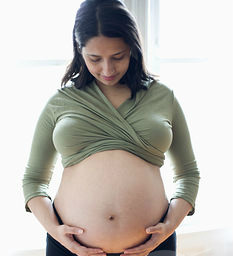 2 Hospitals in the DC area made Consumer Report's top ten list of hospitals that perform high rates of c-sections for low-risk pregnancies. Check out the list yourself and NBC's coverage of the story. |
Archives
May 2016
Categories
All
|

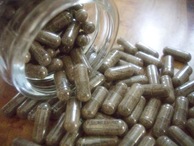

 RSS Feed
RSS Feed
